Unit 4 Humor Writing Workshop课件(共29张PPT)北师大版(2019)选择性必修第二册
文档属性
| 名称 | Unit 4 Humor Writing Workshop课件(共29张PPT)北师大版(2019)选择性必修第二册 | 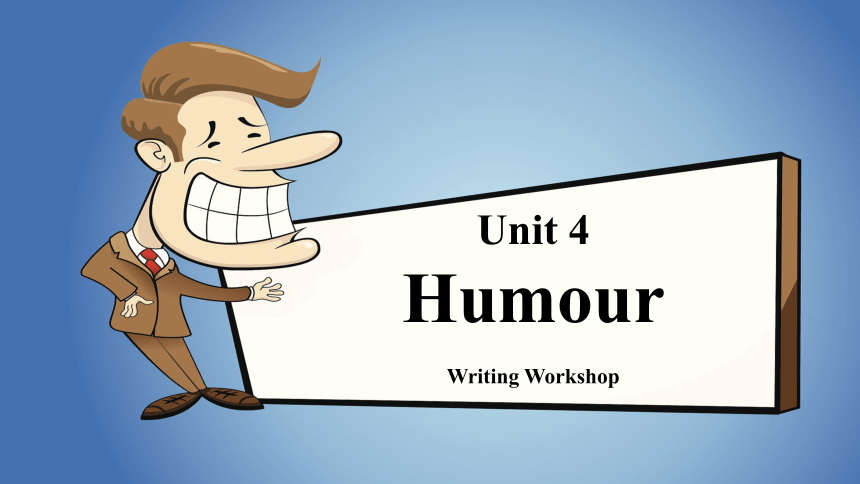 | |
| 格式 | pptx | ||
| 文件大小 | 65.4MB | ||
| 资源类型 | 教案 | ||
| 版本资源 | 北师大版(2019) | ||
| 科目 | 英语 | ||
| 更新时间 | 2025-08-01 11:18:47 | ||
图片预览

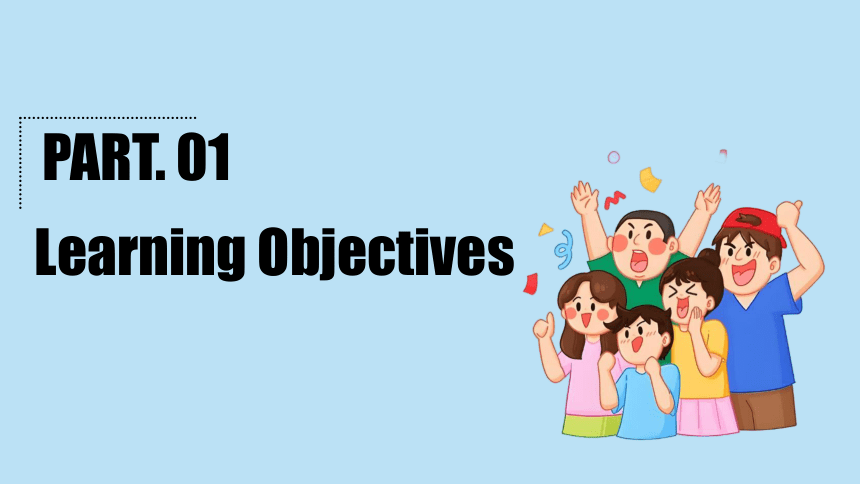
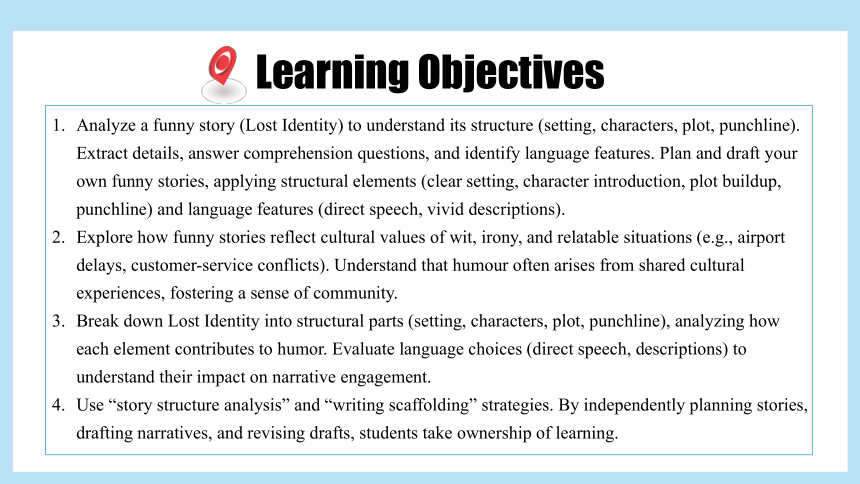
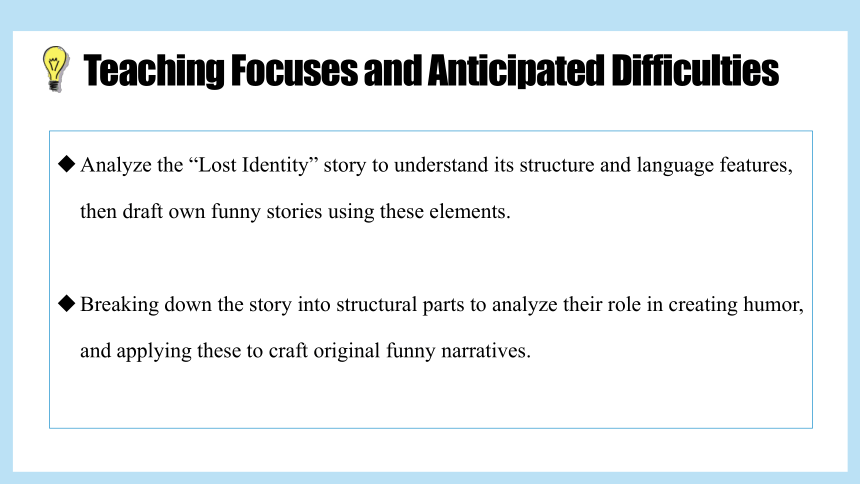


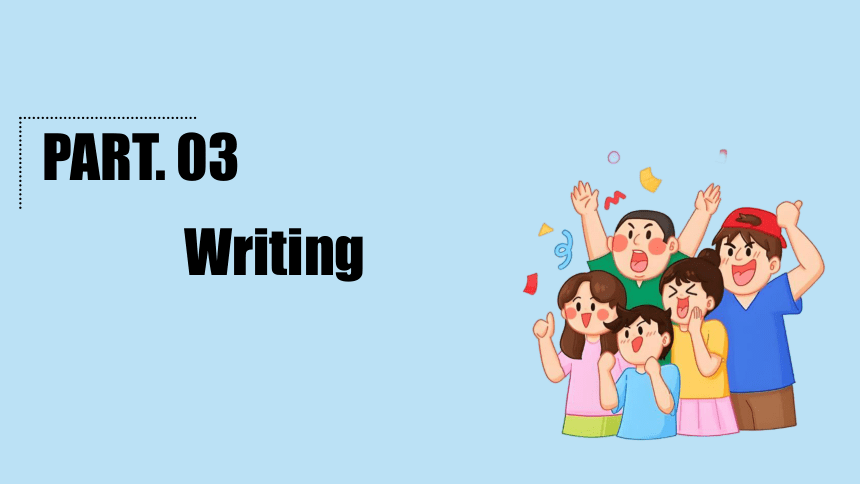
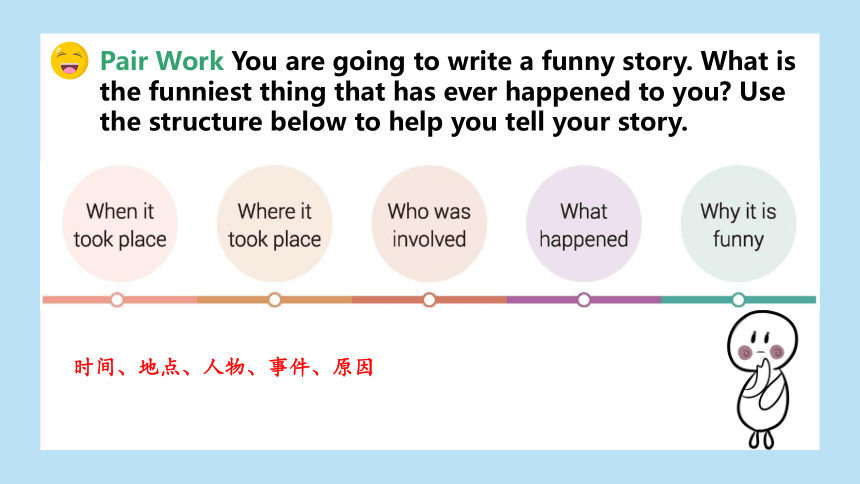
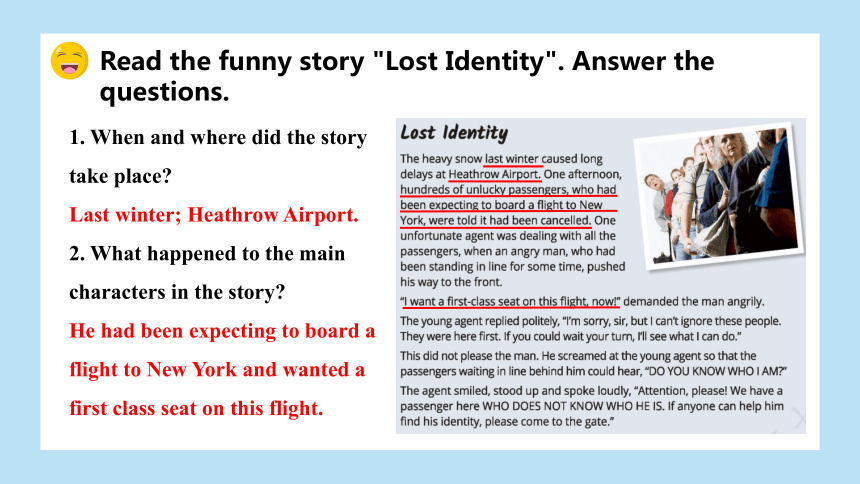
文档简介
(共29张PPT)
Unit 4
Humour
Writing Workshop
Learning Objectives
PART. 01
Understand the daily study and life of British middle school students by watching videos. Based on your own daily study and life, compare the study and life in Chinese and British schools, and find out the similarities and differences between the two. Talk about your first impression of high school life, and have a preliminary perception of the study and life in the senior high school stage.
Learning Objectives
Analyze a funny story (Lost Identity) to understand its structure (setting, characters, plot, punchline). Extract details, answer comprehension questions, and identify language features. Plan and draft your own funny stories, applying structural elements (clear setting, character introduction, plot buildup, punchline) and language features (direct speech, vivid descriptions).
Explore how funny stories reflect cultural values of wit, irony, and relatable situations (e.g., airport delays, customer-service conflicts). Understand that humour often arises from shared cultural experiences, fostering a sense of community.
Break down Lost Identity into structural parts (setting, characters, plot, punchline), analyzing how each element contributes to humor. Evaluate language choices (direct speech, descriptions) to understand their impact on narrative engagement.
Use “story structure analysis” and “writing scaffolding” strategies. By independently planning stories, drafting narratives, and revising drafts, students take ownership of learning.
Understand the daily study and life of British middle school students by watching videos. Based on your own daily study and life, compare the study and life in Chinese and British schools, and find out the similarities and differences between the two. Talk about your first impression of high school life, and have a preliminary perception of the study and life in the senior high school stage.
Teaching Focuses and Anticipated Difficulties
Analyze the “Lost Identity” story to understand its structure and language features, then draft own funny stories using these elements.
Breaking down the story into structural parts to analyze their role in creating humor, and applying these to craft original funny narratives.
Lead-in
PART. 02
Have you ever had an experience of flight delays
Writing
PART. 03
Pair Work You are going to write a funny story. What is the funniest thing that has ever happened to you Use the structure below to help you tell your story.
时间、地点、人物、事件、原因
Read the funny story "Lost Identity". Answer the questions.
1. When and where did the story take place
Last winter; Heathrow Airport.
2. What happened to the main characters in the story
He had been expecting to board a flight to New York and wanted a first class seat on this flight.
Read the funny story "Lost Identity". Answer the questions.
3. Why is the story funny
The main character wanted to make it clear that he was an important person, while the agent got it that he had lost his identity.
Choose the best answer for the following questions according to the passage.
1. What caused the long delays at Heathrow Airport
A. A heavy snow. B. A heavy storm.
C. A sudden flood. D. A strong earthquake.
2. What did the angry man want the agent to do
A. Give the money back to him. B. Help him find out his identity.
C. Make an apology to him. D. Arrange a first-class seat for him.
3. Which of the following words can describe the young agent
A. Mean and selfish. B.Upright and smart.
C. Inefficient and clumsy. D. Stubborn and cold-hearted.
Complete the information in the "Details" column based on the structure given.
Structure Details My funny story
Setting heavy snow; long delays at an airport
Characters
Plot
Punchline
An unfortunate agent was dealing with all the passengers. An angry man pushed his way to the front and asked for a first class seat.
An angry man yelled at the agent “DO YOU KNOW WHO I AM ”
We have a passenger here WHO DOES NOT KNOW WHO HE IS.
Punchline: A punchline is the part that makes people laugh. It is often unexpected, silly, or a play on words.
Write 2-3 sentences about the setting and the plot in your story. Use the Sentence Builder to help you.
Writing a Story
Write an opening sentence to capture your readers’ attention.
The heavy snow last winter caused long delays...
You won’t believe it but...
Use clear sentences to create the setting.
Hundreds of unlucky passengers were told it had been cancelled.
One unfortunate agent was dealing with...
Use descriptive words and direct speech to make the story vivid.
“I want a first class seat on this flight, now!” demanded the man angrily.
The young agent replied politely, “…”
Sentence
Builder
故事性记叙文——幽默故事
一、文体解读
幽默故事属于记事类的记叙文。它以叙事为主要内容,对一件事发生的前因后果及其发展过程进行记述。
记叙文是高考英语必考的文体,无论是阅读还是书面表达都离不开对记叙文的考查,尤其是读后续写,对记叙文的考查达到了一个新的高度。所以,很有必要掌握记叙文的文体特点与结构,开头以及结尾的表达等。
二、写作要点
1. 要交代清楚六要素的内容,即:时间(when)、地点(where)、人物(who)、事件(what)、原因(why)和结果(how)。
2. 在写幽默故事时,可适当使用含蓄、风趣的小对话,以增加文章的生动性和感染力。同时,要了解中西方文化的异同,既要了解表层意思,又要领会深层含义。
3. 事件通常按时间顺序叙述。以时间为顺序的记叙文是高考试题中较为简单的一种文体。在该类文体中往往含有两条重要线索:一个是时间的先后关联;另一个是在时间变化中的情节变化。
4. 时态通常用一般过去时态。
三、常用句式
1. One day/The other day/Many years ago/Long long ago...
2. There was/were/is/are/used to be a...
3. I was doing... when... / suddenly I saw...
4. All of a sudden, something happened to him...
5. There was absolutely nothing I could do about it.
6. He went totally out of control.
7. I started to get the feeling that...
8. It was a real shame that...
9. I had no idea how to...
10. Finally, he said../ responded with a smile on his face.
Outlining Complete the right column of information in Activity 3 based on the funny story you shared at the beginning of the lesson. Or you may start a new story.
Structure Details My funny story
Setting heavy snow; long delays at an airport
Characters
Plot
Punchline
An unfortunate agent was dealing with all the passengers. An angry man pushed his way to the front and asked for a first class seat.
An angry man yelled at the agent “DO YOU KNOW WHO I AM ”
We have a passenger here WHO DOES NOT KNOW WHO HE IS.
Drafting Use your outline and the Writing Help to write your first draft.
Writing a Funny Story
It’s important to:
describe a clear setting (e.g. when, where);
introduce the main character(s) with some detailed information that helps the development of the story;
describe the plot that prepares for the punchline;
deliver the punchline/ funny ending clearly and briefly;
avoid adding anything after the punchline/ funny ending.
Writing
Help
One day, a little boy suffered a lot because of a painful tooth, so his mother took him to the dentist to have the tooth pulled out. The dentist said that he would charge 10 dollars for the job, and the mother agreed. However, much to her surprise, when the work was done, the dentist changed his mind and said they should give 30 dollars to him.
“Thirty dollars! Didn’t you say you would charge ten dollars for this ” asked the woman.
“Yes,” answered the dentist, “but your son cried so terribly that other patients were all frightened away”.
Sample
Editing Edit your story in pairs. Then share what you have written in class.
Does the writer’s opening sentence capture the readers’ attention
Does the writer use short, clear sentences to create the situation
Does the writer use linking words to develop the situation
Does the writer deliver the punchline/funny ending clearly and briefly
Does the writer finish with a punchline
Mark any spelling, punctuation or grammar error.
Mark any unclear expressions. Give suggestions if you can.
Underline the expressions you like.
Vocabulary
1. unfortunate
unfortunately adv. 不幸地;遗憾地
fortune n. 机会;运气;巨款
try one’s fortune 碰运气
bring good fortune 带来好运
seek one’s fortune 寻找出路,寻找发财的机会
make a/one’s fortune 发财
Vocabulary
1. unfortunate
fortunately adv. 幸运地,幸亏
fortunate adj. 运气好的;幸运的
be fortunate to do... 有幸做……
be fortunate in doing... 做……很幸运
例题:
I have been fortunate enough __________(visit) many parts of the world as a lecturer.
to visit
Vocabulary
2. demand
demand to do sth 要求做某事
demand that... (should) do sth 要求……做某事
It is/was demanded that... 要求……
be in (great) demand (迫切)需求
meet/satisfy one's demands 满足某人的需求
demanding adj. 要求严格的,费力的;难满足的
例题:
Her ___________(demand) boss expects reports to be perfect — checking every detail and refusing to accept even small errors.
demanding
Exercise
PART. 04
1. It was u__________(倒霉的) that his phone died just as he was about to take a photo of the rare bird.
2. As a travel a________(代理人), his job is to help clients book flights and hotels, offering advice on the best destinations for their budget.
3. Workers d__________(要求) better safety conditions in the factory, refusing to return to work until their requests were met.
4. Students must a_______(得到) a score of 80% or higher to pass the course, which encourages them to study harder.
nfortunate
Exercise: 单词拼写
gent
emanded
ttain
Summary
PART. 05
Writing Workshop
Vocabulary
第三段:幽默笑点。
Writing
unfortunate, demand
第二段:故事发展过程。
第一段:交代故事发生的背景和人物。
Homework
PART. 06
Polish your writing.
Prepare for the next lesson.
Homework
Unit 4
Humour
Writing Workshop
Learning Objectives
PART. 01
Understand the daily study and life of British middle school students by watching videos. Based on your own daily study and life, compare the study and life in Chinese and British schools, and find out the similarities and differences between the two. Talk about your first impression of high school life, and have a preliminary perception of the study and life in the senior high school stage.
Learning Objectives
Analyze a funny story (Lost Identity) to understand its structure (setting, characters, plot, punchline). Extract details, answer comprehension questions, and identify language features. Plan and draft your own funny stories, applying structural elements (clear setting, character introduction, plot buildup, punchline) and language features (direct speech, vivid descriptions).
Explore how funny stories reflect cultural values of wit, irony, and relatable situations (e.g., airport delays, customer-service conflicts). Understand that humour often arises from shared cultural experiences, fostering a sense of community.
Break down Lost Identity into structural parts (setting, characters, plot, punchline), analyzing how each element contributes to humor. Evaluate language choices (direct speech, descriptions) to understand their impact on narrative engagement.
Use “story structure analysis” and “writing scaffolding” strategies. By independently planning stories, drafting narratives, and revising drafts, students take ownership of learning.
Understand the daily study and life of British middle school students by watching videos. Based on your own daily study and life, compare the study and life in Chinese and British schools, and find out the similarities and differences between the two. Talk about your first impression of high school life, and have a preliminary perception of the study and life in the senior high school stage.
Teaching Focuses and Anticipated Difficulties
Analyze the “Lost Identity” story to understand its structure and language features, then draft own funny stories using these elements.
Breaking down the story into structural parts to analyze their role in creating humor, and applying these to craft original funny narratives.
Lead-in
PART. 02
Have you ever had an experience of flight delays
Writing
PART. 03
Pair Work You are going to write a funny story. What is the funniest thing that has ever happened to you Use the structure below to help you tell your story.
时间、地点、人物、事件、原因
Read the funny story "Lost Identity". Answer the questions.
1. When and where did the story take place
Last winter; Heathrow Airport.
2. What happened to the main characters in the story
He had been expecting to board a flight to New York and wanted a first class seat on this flight.
Read the funny story "Lost Identity". Answer the questions.
3. Why is the story funny
The main character wanted to make it clear that he was an important person, while the agent got it that he had lost his identity.
Choose the best answer for the following questions according to the passage.
1. What caused the long delays at Heathrow Airport
A. A heavy snow. B. A heavy storm.
C. A sudden flood. D. A strong earthquake.
2. What did the angry man want the agent to do
A. Give the money back to him. B. Help him find out his identity.
C. Make an apology to him. D. Arrange a first-class seat for him.
3. Which of the following words can describe the young agent
A. Mean and selfish. B.Upright and smart.
C. Inefficient and clumsy. D. Stubborn and cold-hearted.
Complete the information in the "Details" column based on the structure given.
Structure Details My funny story
Setting heavy snow; long delays at an airport
Characters
Plot
Punchline
An unfortunate agent was dealing with all the passengers. An angry man pushed his way to the front and asked for a first class seat.
An angry man yelled at the agent “DO YOU KNOW WHO I AM ”
We have a passenger here WHO DOES NOT KNOW WHO HE IS.
Punchline: A punchline is the part that makes people laugh. It is often unexpected, silly, or a play on words.
Write 2-3 sentences about the setting and the plot in your story. Use the Sentence Builder to help you.
Writing a Story
Write an opening sentence to capture your readers’ attention.
The heavy snow last winter caused long delays...
You won’t believe it but...
Use clear sentences to create the setting.
Hundreds of unlucky passengers were told it had been cancelled.
One unfortunate agent was dealing with...
Use descriptive words and direct speech to make the story vivid.
“I want a first class seat on this flight, now!” demanded the man angrily.
The young agent replied politely, “…”
Sentence
Builder
故事性记叙文——幽默故事
一、文体解读
幽默故事属于记事类的记叙文。它以叙事为主要内容,对一件事发生的前因后果及其发展过程进行记述。
记叙文是高考英语必考的文体,无论是阅读还是书面表达都离不开对记叙文的考查,尤其是读后续写,对记叙文的考查达到了一个新的高度。所以,很有必要掌握记叙文的文体特点与结构,开头以及结尾的表达等。
二、写作要点
1. 要交代清楚六要素的内容,即:时间(when)、地点(where)、人物(who)、事件(what)、原因(why)和结果(how)。
2. 在写幽默故事时,可适当使用含蓄、风趣的小对话,以增加文章的生动性和感染力。同时,要了解中西方文化的异同,既要了解表层意思,又要领会深层含义。
3. 事件通常按时间顺序叙述。以时间为顺序的记叙文是高考试题中较为简单的一种文体。在该类文体中往往含有两条重要线索:一个是时间的先后关联;另一个是在时间变化中的情节变化。
4. 时态通常用一般过去时态。
三、常用句式
1. One day/The other day/Many years ago/Long long ago...
2. There was/were/is/are/used to be a...
3. I was doing... when... / suddenly I saw...
4. All of a sudden, something happened to him...
5. There was absolutely nothing I could do about it.
6. He went totally out of control.
7. I started to get the feeling that...
8. It was a real shame that...
9. I had no idea how to...
10. Finally, he said../ responded with a smile on his face.
Outlining Complete the right column of information in Activity 3 based on the funny story you shared at the beginning of the lesson. Or you may start a new story.
Structure Details My funny story
Setting heavy snow; long delays at an airport
Characters
Plot
Punchline
An unfortunate agent was dealing with all the passengers. An angry man pushed his way to the front and asked for a first class seat.
An angry man yelled at the agent “DO YOU KNOW WHO I AM ”
We have a passenger here WHO DOES NOT KNOW WHO HE IS.
Drafting Use your outline and the Writing Help to write your first draft.
Writing a Funny Story
It’s important to:
describe a clear setting (e.g. when, where);
introduce the main character(s) with some detailed information that helps the development of the story;
describe the plot that prepares for the punchline;
deliver the punchline/ funny ending clearly and briefly;
avoid adding anything after the punchline/ funny ending.
Writing
Help
One day, a little boy suffered a lot because of a painful tooth, so his mother took him to the dentist to have the tooth pulled out. The dentist said that he would charge 10 dollars for the job, and the mother agreed. However, much to her surprise, when the work was done, the dentist changed his mind and said they should give 30 dollars to him.
“Thirty dollars! Didn’t you say you would charge ten dollars for this ” asked the woman.
“Yes,” answered the dentist, “but your son cried so terribly that other patients were all frightened away”.
Sample
Editing Edit your story in pairs. Then share what you have written in class.
Does the writer’s opening sentence capture the readers’ attention
Does the writer use short, clear sentences to create the situation
Does the writer use linking words to develop the situation
Does the writer deliver the punchline/funny ending clearly and briefly
Does the writer finish with a punchline
Mark any spelling, punctuation or grammar error.
Mark any unclear expressions. Give suggestions if you can.
Underline the expressions you like.
Vocabulary
1. unfortunate
unfortunately adv. 不幸地;遗憾地
fortune n. 机会;运气;巨款
try one’s fortune 碰运气
bring good fortune 带来好运
seek one’s fortune 寻找出路,寻找发财的机会
make a/one’s fortune 发财
Vocabulary
1. unfortunate
fortunately adv. 幸运地,幸亏
fortunate adj. 运气好的;幸运的
be fortunate to do... 有幸做……
be fortunate in doing... 做……很幸运
例题:
I have been fortunate enough __________(visit) many parts of the world as a lecturer.
to visit
Vocabulary
2. demand
demand to do sth 要求做某事
demand that... (should) do sth 要求……做某事
It is/was demanded that... 要求……
be in (great) demand (迫切)需求
meet/satisfy one's demands 满足某人的需求
demanding adj. 要求严格的,费力的;难满足的
例题:
Her ___________(demand) boss expects reports to be perfect — checking every detail and refusing to accept even small errors.
demanding
Exercise
PART. 04
1. It was u__________(倒霉的) that his phone died just as he was about to take a photo of the rare bird.
2. As a travel a________(代理人), his job is to help clients book flights and hotels, offering advice on the best destinations for their budget.
3. Workers d__________(要求) better safety conditions in the factory, refusing to return to work until their requests were met.
4. Students must a_______(得到) a score of 80% or higher to pass the course, which encourages them to study harder.
nfortunate
Exercise: 单词拼写
gent
emanded
ttain
Summary
PART. 05
Writing Workshop
Vocabulary
第三段:幽默笑点。
Writing
unfortunate, demand
第二段:故事发展过程。
第一段:交代故事发生的背景和人物。
Homework
PART. 06
Polish your writing.
Prepare for the next lesson.
Homework
同课章节目录
- Unit 4 Humour
- Lesson 1 What’s So Funny?
- Lesson 2 Why Do We Need Humour?
- Lesson 3 My Favourite Comedian
- Unit 5 Education
- Lesson 1 Enlightening a Mind
- Lesson 2 The Objectives of Education
- Lesson 3 Understanding
- Unit 6 The Media
- Lesson 1 From Page to Screen
- Lesson 2 Questions about Media
- Lesson 3 The Advertising Game
